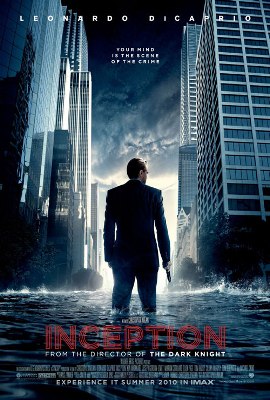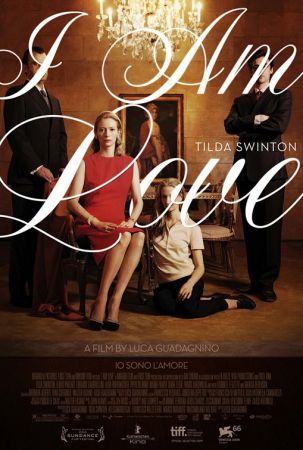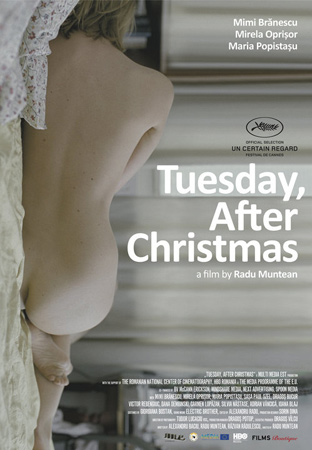Thirteen Great Movies We Watched in 2010
By Rob Christopher in Arts & Entertainment on Dec 20, 2010 4:20PM
 The "screener," a free DVD sent to journos and critics by studios and movie PR folks, is a very useful tool for compiling year-end lists. Ben Kenigsberg at Time Out Chicago also thinks they can ruin the whole experience.
The "screener," a free DVD sent to journos and critics by studios and movie PR folks, is a very useful tool for compiling year-end lists. Ben Kenigsberg at Time Out Chicago also thinks they can ruin the whole experience.
Perhaps. But we'd like to level with you: since we here at Chicagoist are not quite quote-unquote professionals, our access to screeners and critic's screenings in general can be highly variable. We haven't seen The King's List, or Black Swan, or The Fighter, or a lot of the other Golden Globe nominees. It's not that we're avoiding them. We just haven't seen them yet (and, we're guessing, neither have most of you).
Fact is we watched plenty of great movies this year, and as we've said before, we could care less if they actually "came out" this year. Movie viewing for the average person does not neatly match up with an arbitrary calendar. And so it is for us too. When seen for the first time, a great movie is delightfully fresh whether it was made yesterday or 50 years ago. Later this week we'll be reeling off some hits and misses of the year in film, but for now here are thirteen of the best movies we saw for the first time in 2010 (in alphabetical order). Apologies to triskaidekaphobics out there.
- The Adults in the Room (directed by Andy Blubaugh, 2010)
Easily the most engaging new GLBT movie we watched this year, when The Adults in the Room played at Reeling in November, we wrote that it "explores autobiography, coming-of age and teen sexuality, three subjects so fraught with the potential for both excess and cliched interpretation that they generally shouldn't be explored by anyone still cutting their teeth. Or rather, they should be explored, but we should not be forced to watch. In Blubaugh's hands, these elements get jostled around in such an assured and daring mix of narrative and documentary context that self-indulgence is kept at bay and the reflectiveness at its core is captivating." - The Bad Lieutenant: Port of Call New Orleans (directed by Werner Herzog, 2009) This is exactly how we like Nicolas Cage: wacked out and game for anything. Herzog turns the hackneyed police procedural on its ear, ranging from an Iguanacam to a purposefully contrived happy ending. The result was, moment-to-moment, the most fun we had at the movies all year.
- Before Sunset (directed by Richard Linklater, 2004) We did a double feature at home: Before Sunrise followed by its belated sequel. And wouldn't you know, Before Sunset not only complements the original beautifully but even surpasses it. Maybe we're just getting old. But we daresay we've never seen a portrait of regret and longing that's more affecting. The last two minutes constitute one of the most breathtaking endings in modern film: Julie Delpy dancing to Nina Simone, while Ethan Hawke gazes at her wistfully and says, "I know."
- I Am Love (directed by Luca Guadagnino, 2009) We admit it: we're suckers for Tilda Swinton. The woman can really do no wrong. And we really fell for her in I Am Love: "Swinton is by turns graceful, earthy, restrained, frenzied, and never less than magnetic. It's another flawless performance, and it's surrounded by a film that thoroughly does it justice." If you missed it earlier this year, it's absolutely worth catching up with over the holidays.
- Inception (directed by Christopher Nolan, 2010) A summer blockbuster that, gasp, actually encourages the audience to use their brains even as it thrills the senses ? More please! As The AV Club points out, "Think of that final shot as a mystery never to be solved in a film that never truly ends." We can't wait to see it again now that it's on DVD.
- Inside Job (directed by Charles Ferguson, 2010) Lucid and frightening, this documentary summarizes the hows and whys of the 2008 financial collapse. The feel-bad movie of the year--if you aren't angry and depressed as the end credits roll, you must be asleep. A return engagement at the Siskel next month gives you another chance to experience it the best possible way: in a theatre, where several members of the audience will invariably interject their own stunned commentary.
- In the Loop (directed by Armando Iannucci, 2009) A comedy this exquisitely profane comes along once in a blue moon, and the fact that it (fictionally) deals with the lead-up to the Iraq war is perfection itself. Karina Longworth wrote, "The first thing that marks In The Loop as a break from the norm is its refusal to flatter the viewer's intelligence; the second, is the way the film forces them to use it." See this one.
- La Porte, Indiana (directed by Jason Bitner, 2010)
"What we see is basically the story of America over the last 50 years, simultaneously tender, wistful, depressing, and inspiring," we wrote after seeing it at the Siskel. "Somehow LaPorte, Indiana is able to strip away the sentimental varnish from American symbols like red pickup trucks, parades, teenaged sweethearts, and the proverbial corner store." - To Be or Not To Be (directed by Ernst Lubitch, 1942) If you ever need to back up the assertion that "they just don't make 'em like they used to," Lubitch's hilarious, daring, and tightly-wound wartime farce could easily serve as Exhibit A. It probably couldn't be made today; or if it was, it'd go horribly awry (Life is Beautiful anyone?)
- Tuesday, After Christmas (directed by Radu Muntean, 2010) It's hard to watch a movie entirely concerned with how a relationship ends, but when it's this skillfully done it's almost exhilarating. Muntean, we observed, "doesn’t cut away from the action when things get awkward and painful. The result is a portrait of disintegration so centered in a recognizable reality that it’s bound to be difficult viewing for married couples, who will probably relate all too easily to the many ways Paul and Adriana have grown apart even while growing familiar ... We certainly don’t recommend seeing this on a date, but Tuesday, After Christmas confirms that some of the most searing films being made about the human condition today are coming straight out of Bucharest."
- Uncle Boonmee Who Can Recall His Past Lives (directed by Apichatpong Weerasethakul, 2010) There are plenty of movies with explosions, gunfire, violence, and killing. Only some of which involve robots. We need more gentle movies. This Cannes-prizewinner is as refreshing as a dip in a secluded mountain pool. It's "as languidly paced as any film in recent memory, but the coupling of its magnificent visuals and wry sense of humor seem to suspend time. Even when nothing is 'happening,' the screen is dense with textures and details to take in. We wouldn’t dream of spoiling the ending by writing about it. Suffice it to say that If you give yourself over to Uncle Boonmee, it won’t be hard to find yourself under its spell." It played at CIFF, but this will get a proper release in 2011.
- Up in the Air (directed by Jason Reitman, 2009) Absolutely the right movie at the right time. Perfectly cast. Never maudlin, but funny and touching and insightful in equal measure. As Roger Ebert writes, "This isn't a comedy. If it were, it would be hard to laugh in these last days of 2009. Nor is it a tragedy. It's an observant look at how a man does a job." Reitman must have learned a thing or two from Alexander Payne; the characters in the screenplay which he co-wrote with Sheldon Turner rival Payne's in their fully believable idiosyncrasies.
- The White Ribbon (directed by Michael Haneke, 2009) "Austere, wintry, ethereal, nerve-wracking: all good adjectives to describe Michael Haneke's Oscar-nominated film The White Ribbon," a film which held us fast even while making us squirm. "Unwrapping this mystery is like peeling an onion, albeit a gorgeous onion that rivets your attention even while making your eyes tear up." Haneke unleashes his new film in 2011.

